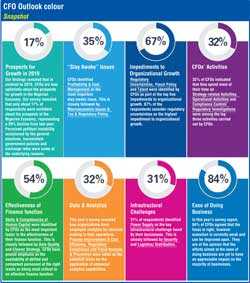Thursday Feb 19, 2026
Thursday Feb 19, 2026
Monday, 8 April 2019 00:00 - - {{hitsCtrl.values.hits}}
The survey revealed that in contrast to 2018, CFOs are less optimistic about the prospects for growth in the economy. Only about 17% of respondents were confident about the prospects of the economy, representing a 29% decline from last year. Perceived political instability occasioned by the general elections, inconsistent government policies and exchange rates were some of the underlying reasons.

CFOs identified Profitability and Cost Management as the issues that keep them up at night.
Similar to all other functions, skills and competencies of human capital are the most important factors in the effectiveness of the finance function which is closely followed by data quality and clearer strategy.
In this year’s survey report, 84% of CFOs agreed that their focus is correct, though execution is currently weak and can be improved upon. They are of the opinion that efforts aimed at improving the ease of doing business are yet to have a tangible impact on the majority of businesses.
According to First Bank of Nigeria CFO Patrick Iyambo: “Given the priorities of the Government, there will be a push to keep interest rates low and exchange rate stable, although market forces may force them up a bit.”
The outlook is similar in the Sri Lankan context as well, with concerns on growth with the prevailing macroeconomic factors. Concerns on political uncertainty, regulatory inconsistency and ineffective implementation of policies related to industry challenges were some of the reasons globally.
At the organisational level, CFOs are more confident about future prospects for their respective organisations. They expect strategies to be implemented in areas of technology improvement, digitisation and cost performance and expect that these will positively impact on the company’s performance in 2019.
Globally, CFOs mostly raised their concerns in association with risk and strategy implementation themes.
The survey also identified top impediments for growth and profitability, and regulatory uncertainty tops the chart as the CFOs identified this as a key issue.
From a sector point of view, Regulatory Concerns were more prevalent in the Financial Services Industry (42%) and Energy and Natural Resources Sector (22%) where respondents identified Regulatory Uncertainties as a major impediment.
The other top four impediments to organisational growth and profitability include Political Uncertainties, Fiscal Policy, Monetary Policy, and Access to Finance/Cost of Funds, as well as People/Talent Issues.
Operational Performance – How effective are we?
While CFOs identified strategy-related activities as the primary focus of their role, the survey indicated that a significant proportion of the CFOs time (44%) is still spent on carrying out operational and reporting activities such as bookkeeping, transaction processing, month and quarter-end reporting, etc.
This indicates a need to leverage technology as well as other transformation initiatives, to minimise the time commitment of the CFO office to non-productive repetitive tasks.
Other areas identified where significant amounts of time is spent include; Compliance Control/Regulatory Investigations, Reporting and Investor/Stakeholder Engagement.
When understanding the levels of satisfaction among CFOs in terms of their strategies, they were relatively satisfied with strategies deployed in Regulatory, People, Planning and Working Capital Management. However, significant concerns were identified as to the effectiveness of strategies deployed in the areas of digitisation, cost optimisation and business partnering.
Factors impacting on effectiveness
Comprehensive emphasis was made on availability of skilled and competent personnel at the right levels as being most critical to an effective finance function.
Moreover factors such as the physical environment, reward and recognition have been identified as critical to the effectiveness of the finance function.
Cyber Risks – measuring and managing
Today’s businesses are in the era of technology-driven disruptions to business models. Customers/stakeholders expect organisations to be more agile, have better interaction with customers and provide real-time solutions to address their needs.
While technology has enabled these disruptive business models, increasingly, cyber risks have emerged as a primary concern across board. Significant adverse impacts have been witnessed of cyber-attacks on organisations revenue, reputation, share prices etc.
Throughout the CFO survey, it was agreed that their company’s approach to managing cyber risks is still inadequate. KPMG agrees that cyber vigilance has moved up the agenda.
Analysing data
Reviewing how organisations have employed analytics for decision making in their operations, it was found that the majority of CFOs either do not currently using analytics capabilities within their operations or utilise it only for descriptive purposes (i.e. what has happened).
Process improvement and cost efficiency; regulatory compliance and fraud analysis and prevention are some of the potential areas of application for advanced analytics capabilities.
Use of MS Excel has been identified as the most prevalent analytical tool, with over 50% of respondents identifying MS Excel as the primary tool employed. Other tools employed include: SAP/ERP, PowerBI, Kibana, InCMS are the major analytical tools being used by CFOs.
Enabling the environment
The top three areas expected to unlock growth as identified by CFOs were; Infrastructure, Macroeconomic Environment, Tax and Regulation.
KPMG released the CFO outlook survey in late March, this international global survey of CFOs and other senior finance executives of organisations worldwide is one of the most comprehensive and long running survey series of its kind.
The survey has been conducted regularly since 2006, charting the evolution of finance departments and identifying leading financial management practices of high-performing companies. CFOs and Heads of Finance in leading organisations across all major sectors shared their opinions on the outlook for their businesses, their strategies for cost and risk management and the priorities for an enabling environment.